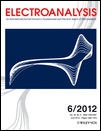
ELECTROANALYSIS
metrics 2024
Bridging Theory and Application in Electrochemical Research
Introduction
ELECTROANALYSIS is a premier journal published by WILEY-V C H VERLAG GMBH that serves the dynamic field of analytical and electrochemistry. Established in 1989, this scholarly publication has successfully converged its focus to cover a wide array of topics including novel electrochemical methods, sensor technology, and environmental analysis, reflecting the latest advancements and trends in the field. With an impressive 2023 impact factor that places it in the Q2 quartile of Analytical Chemistry and Q3 quartile in Electrochemistry, the journal is recognized for its high-quality research and contributions. Its Scopus rankings further reinforce its credibility, standing at #46/156 in Analytical Chemistry and #26/60 in Electrochemistry. Although currently not offering Open Access, the journal remains a significant resource for researchers, professionals, and students keen to stay at the forefront of electroanalytical techniques. With a global readership, ELECTROANALYSIS continues to drive knowledge and innovation within the scientific community.
Metrics 2024
 0.47
0.47 2.70
2.70 2.70
2.70 139
139Metrics History
Rank 2024
Scopus
IF (Web Of Science)
JCI (Web Of Science)
Quartile History
Similar Journals
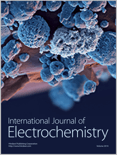
International Journal of Electrochemistry
Exploring the synergy of science and innovation in electrochemistry.The International Journal of Electrochemistry, published by HINDAWI LTD, serves as a premier outlet for cutting-edge research in the expansive field of electrochemistry. With an ISSN of 2090-3529 and an E-ISSN of 2090-3537, this open-access journal has been contributing to the advancement of scientific knowledge since 2011, making its content freely available to researchers, industry professionals, and students around the globe. The journal aims to foster innovation by disseminating high-quality research articles, reviews, and technical notes that encompass a wide range of topics from fundamental electrochemical principles to practical applications in energy storage, sensors, and material development. With a focus on promoting interdisciplinary collaboration and advancing the understanding of electrochemical systems, the International Journal of Electrochemistry is a vital resource for anyone involved in electrochemical research and its applications.

SENSORS AND ACTUATORS B-CHEMICAL
Advancing the Frontiers of Sensor Technology.SENSORS AND ACTUATORS B-CHEMICAL, published by ELSEVIER SCIENCE SA, is a premier scientific journal that occupies a vital niche in the field of materials science and engineering. With an impressive impact factor and ranking in the Q1 category across multiple disciplines, including Condensed Matter Physics, Electrical and Electronic Engineering, and Materials Chemistry, this journal is recognized as a leading source of innovative research and developments in sensor technologies and their chemical applications. The journal disseminates high-quality articles with a focus on the design, fabrication, and application of sensors and actuators, promoting valuable insights that cater to researchers, professionals, and students alike. As a testament to its scholarly significance, SENSORS AND ACTUATORS B-CHEMICAL remains pivotal for those seeking to advance their understanding of electronic, optical, and magnetic materials. The journal is accessible primarily through subscription, ensuring a wide reach to the academic community, and contributing significantly to the ongoing exploration and interdisciplinary collaboration in this dynamic field.
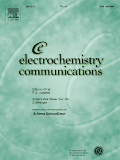
ELECTROCHEMISTRY COMMUNICATIONS
Exploring the Frontiers of Electrochemistry with Impactful FindingsELECTROCHEMISTRY COMMUNICATIONS, published by ELSEVIER SCIENCE INC, is a leading journal in the field of electrochemistry, holding a prestigious position in the Q1 quartile since 2023. With an impact factor reflecting its esteemed reputation, the journal ranks #15 out of 60 in the Scopus Chemistry category for Electrochemistry, placing it in the 75th percentile. Since adopting an Open Access model in 2019, it has garnered widespread visibility and accessibility, enabling researchers and professionals to share groundbreaking findings and foster innovation. Covering a wide range of topics from fundamental electrochemical research to practical applications, ELECTROCHEMISTRY COMMUNICATIONS serves as a critical platform for disseminating knowledge and advancing the field. The journal's commitment to quality and relevance positions it as a vital resource for academics and practitioners striving to stay at the forefront of electrochemical science.
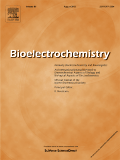
BIOELECTROCHEMISTRY
Pioneering Discoveries in Bioelectrochemical ApplicationsBIOELECTROCHEMISTRY, published by Elsevier Science SA, is a leading academic journal that focuses on cutting-edge research in the fields of biophysics, electrochemistry, and miscellaneous medicine with a commendable impact factor reflecting its significance in the scientific community. Established in 2000 and continuing until 2025, the journal resides in the Netherlands and has been ranked in the Q2 category across various relevant disciplines, such as Biochemistry, Genetics and Molecular Biology, and Physical and Theoretical Chemistry, showcasing its quality and relevance. With a Scopus ranking that places it among the top journals in its categories—including an impressive 12th rank in Electrochemistry—BIOELECTROCHEMISTRY serves as a critical platform for researchers and professionals seeking to disseminate and engage with innovative findings. While the journal does not offer Open Access options, its reputation and reach make it an essential reference point for anyone involved in bioelectrochemical studies. The journal’s commitment to advancing knowledge in electrochemical applications in biological systems ensures its esteemed position in academia.

CHINESE JOURNAL OF ANALYTICAL CHEMISTRY
Unveiling New Horizons in Chemical AnalysisCHINESE JOURNAL OF ANALYTICAL CHEMISTRY, published by SCIENCE PRESS in China, stands as a prominent platform in the field of analytical chemistry since its inception in 1989. With its ISSN 0253-3820 and E-ISSN 1872-2040, the journal maintains a vital role in disseminating empirical research and innovative methodologies, contributing to the advancement of analytical techniques and their applications. The 2023 Scopus ranking positions the journal in the third quartile (Q3) within its category, reflecting a respectable standing among its peers. Researchers, professionals, and students alike engage with a broad range of topics, from instrumental analysis to environmental monitoring, each aiming to foster further scientific inquiry. Although it does not currently offer Open Access, the journal's rich repository of knowledge continues to be an essential resource for those in the analytical chemistry community, with an enduring commitment to scientific excellence and collaboration.

International Journal of Electrochemical Science
Connecting scholars to foster innovation in electrochemistry.International Journal of Electrochemical Science is a peer-reviewed journal dedicated to disseminating cutting-edge research in the field of electrochemistry. Published by Elsevier in Serbia, this journal serves as a vital platform for scientists and researchers to explore innovative electrochemical techniques, processes, and applications. With an ISSN of 1452-3981, it has been a respected source of scholarly articles since its inception in 2006 and continues to bridge the gap between theoretical advancements and practical implementations up until 2024. Notably, it holds a Q4 quartile ranking in the field of electrochemistry and ranks 41 out of 60 in the Scopus database, situating it within the 32nd percentile among its peers. The journal champions open academic discourse, contributing significantly to the advancement of knowledge in electrochemical sciences, making it an essential resource for researchers, professionals, and students alike who are striving towards new discoveries and innovations.
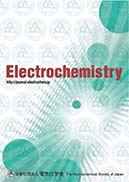
ELECTROCHEMISTRY
Championing Open Access for Electrochemical AdvancementsELECTROCHEMISTRY is an esteemed journal published by the Electrochemical Society of Japan, dedicated to advancing the field of electrochemical science and technology. With an ISSN of 1344-3542 and an E-ISSN of 2186-2451, this journal has been providing a platform for scholarly communication since its inception in 1996, with a converged scope extending to 2024. As an Open Access publication since 2020, it facilitates the wide dissemination of research, fostering collaboration among researchers, professionals, and students alike. Currently positioned in Q3 of the electrochemistry category and ranking 52 out of 60 in Scopus, ELECTROCHEMISTRY is committed to publishing high-quality, peer-reviewed articles that explore novel electrochemical systems, applications, and methodologies. With its base in Tokyo, Japan, the journal serves a global audience, promoting cutting-edge research that drives innovation in energy, materials science, and analytical chemistry.

Talanta Open
Championing Quality and Accessibility in ScienceTalanta Open (ISSN: 2666-8319) is a prominent open-access journal published by Elsevier, dedicated to advancing the field of Analytical Chemistry. Established in 2020, the journal aims to foster innovative research and facilitate knowledge sharing in the analysis of chemical substances and their interactions. With an impressive Q2 ranking in the Analytical Chemistry category and a commendable Scopus ranking of #57/156, Talanta Open has quickly established itself as a vital resource for researchers, professionals, and students alike. The journal is known for its rigorous peer-review process and commitment to quality, ensuring that published content significantly contributes to the scientific community. By providing unrestricted access to high-quality research, Talanta Open underscores the importance of collaboration and accessibility in the ever-evolving landscape of analytical science.

Journal of the Korean Electrochemical Society
Catalyzing Collaboration in the Electrochemical CommunityJournal of the Korean Electrochemical Society (ISSN: 1229-1935, E-ISSN: 1229-1935) stands as a prominent publication in the rapidly evolving field of electrochemistry. Published by the prestigious Korean Electrochemical Society, this journal serves as a vital platform for researchers, professionals, and students eager to disseminate and access cutting-edge studies related to electrochemical processes, materials, and technologies. With an emphasis on promoting innovative research and practical applications, the journal aims to foster collaboration and knowledge exchange within the global electrochemistry community. Although not an open access journal, it provides comprehensive and rigorous peer-reviewed content that ensures the highest scientific quality, making it a valuable resource for anyone involved in the field. Located in Seoul, South Korea, it continues to contribute significantly to the advancement of electrochemical sciences, addressing key challenges and developments that shape the future of technology and environmental sustainability.

Sensors and Actuators Reports
Driving Excellence in Multidisciplinary ResearchSensors and Actuators Reports, published by Elsevier, is a premier open access journal that has been contributing to the fields of physics, computer science, and engineering since its establishment in 2019. With its ISSN 2666-0539, this journal has rapidly gained recognition, achieving Q1 quartile rankings across multiple categories, including Atomic and Molecular Physics, Computer Science, and Electrical Engineering. By providing a platform for high-quality research and innovative findings, Sensors and Actuators Reports is dedicated to advancing knowledge in sensor and actuator technologies, which are pivotal for numerous applications in modern science and industry. The journal's performance is underscored by its impressive Scopus rankings, placing it in the top tiers across various disciplines. Open access ensures that research is widely disseminated, fostering collaboration and enabling researchers, professionals, and students alike to engage with the latest advancements in their fields.